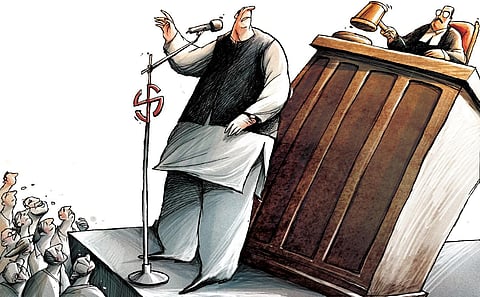

Rahul Gandhi’s disqualification has raised more interest and debate on his welfare or illfare than the erstwhile Member of Parliament has created over the last several years. The political impact of whether this event can finally make the Gandhi scion a robust factor in the next elections or unify the opposition is being debated. The liberals ruminate on the falling pedestal of democracy in India, with the blame falling on an “authoritarian” government “trampling” democracy.
Whether the political debaters or the liberal philosophers will succeed in making any impact with their discourses is a moot question. But what seems to escape most people who are sympathetic to Rahul’s cause are the legal and constitutional nuances and realities.
The first question is why he was disqualified and whether the disqualification is constitutionally and legally supported. The next would be whether such laws brook no exceptions and are strictly applicable, which then leads to the third and vital question of the effect of such laws on constitutional guarantees like free speech, their effect on democratic values, the dangers they pose to the future of democracy in India, and the attendant problems of their misuse for political purposes.
The answer to the first question is fairly simple. The Constitution of India recognises the right of citizens to be members of Parliament and provides for their ineligibility/disqualification through valid laws made by Parliament. To this end, the Representation of People’s Act, which has held the field for decades, expressly provides for disqualification and/or ineligibility to contest elections for a designated period—should a person be convicted of a crime and sentenced to imprisonment for two years or more. The effect of this Act, prior to its amendment, was that the disqualification or ineligibility would arise immediately on such conviction and sentence being passed.
An attempt by Parliament to include a “saving clause” of holding at bay such disqualification for a period in which an appeal may be filed against such conviction or if filed, decided by the appellate court, found strong disfavour with the Supreme Court, which then struck it down as unconstitutional. The effect of this was that immediately upon conviction and sentencing, a sitting member would stand disqualified with no further action needed.
Seeing the dangers which could arise from this situation, the then Congress government headed by Manmohan Singh proposed an immediate ordinance giving a short “sunset” period to enable the hapless convict to get a stay of the judgment from an appellate court, in which event the disqualification would not take effect.
The ordinance, however, was withdrawn, ironically due to the theatrics of Rahul Gandhi, who saw fit to tear a copy of it at a press conference, criticising it as being retrograde. Such public performance of dissent by the scion of the First Family of the Congress forced the then prime minister to withdraw the ordinance.
And so, in its own invidious way, fate has intervened and hoisted the young Gandhi on his own petard. Disqualification is the inevitable fallout of constitutional provisions which allow no exception—even for a Gandhi!
But all is not lost. The Supreme Court, in a subsequent decision, has ruled that an appellate court has the power to stay the judgment and conviction, and the immediate result would be that the disqualification or ineligibility would not arise or continue to be effective. Should Rahul get the appellate court to agree that there are strong grounds to question the correctness of the judgment and therefore stay the same, he would once again be able to enter Parliament.
Myriad questions arise from this legal position. What if the conviction is stayed or the judgment reversed on appeal, or the sentence is reduced to less than two years? Would then the period of disqualification, which need not have occurred, not have deprived the constituency of the representative the people had voted for? And, of course, would the party not be deprived of one of their members being available to further their causes and vote in the house?”
It is this possibility that prompted Manmohan Singh in his wisdom to bridge the lacunae arising through such strict application of the law. Unfortunately, Rahul saw fit to ridicule it, and it would now require the government of the day commanding the majority of the House to bring in the necessary legislation.
Insofar as Rahul’s conviction for defamation is concerned, while defamation is not considered a heinous offence, it is capable of crippling another’s reputation, which is often far more difficult to repair or rebuild than more material objects. But more importantly, the Indian Penal Code makes it a criminal offence and renders the perpetrator liable to be sentenced to two years of imprisonment.
As to whether the judgment is correct in finding his statements defamatory or justifying a sentence of two years would be decided by the appellate court. But the liability to be punished is legally and constitutionally permissible. Even the Constitution, while safeguarding freedom of speech as a fundamental right, has mandated restrictions—including defamatory speech. And the Constitution applies equally to a person who is a Member of Parliament or another citizen. The former is not given the licence to defame as a perquisite of office. Even liberties have their constraints as was attributed to Gladstone, who said “Your liberty ends where my nose begins!”
Viewed thus, the provisions disqualifying a member are not an assault on the Constitution or its democratic values. Of course, despite this legal position, the critic may well point to the possibility of frivolous cases and unjustified actions jeopardising the system. But for that we have to put our faith in the fairness of the judiciary, the voice of the people and respect for the rule of law. If that be utopian, so be it. But I am an eternal optimist!
C Aryama Sundaram
Senior Advocate, Supreme Court of India